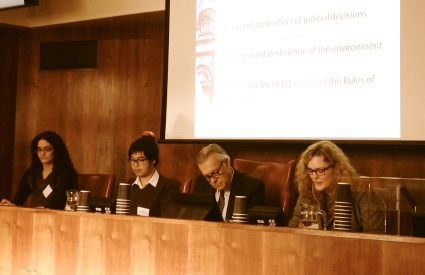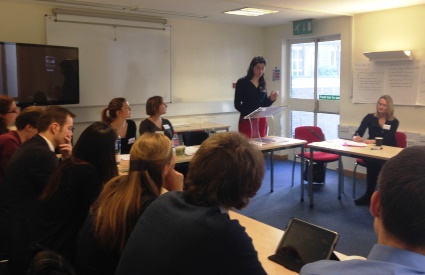UCL-KCL Postgraduate Environmental Law Symposium examines key environmental challenges
Stephen Minas, Phd student and Research Fellow at the Transnational Law Institute, reports on the recent UCL-KCL Postgraduate Environmental Law Symposium
'The intensification of environmental crisis and the shifting terrain of global governance are bringing about what one scholar has dubbed ‘the coexistence of a no-analog ecological future and a no-analog legal future’. It was in this context of flux that environmental law academics, researchers and students convened in Bloomsbury on 18 February for the third University College London - King’s College London Postgraduate Environmental Law Symposium. Hosted by the UCL Faculty of Laws, the Symposium was an opportunity for PhD and masters researchers to present their work on a wide range of environmental law topics.

The panel on international law
Organised by PhD researchers Ioanna Hadjiyianni (King’s) and Olivia Hamlyn (UCL), the Symposium was supported by the UCL Faculty of Laws, the UCL Centre for Law and Environment and The Dickson Poon School of Law. Faculty from the two law schools as well as Queen Mary University of London gave of their time to moderate sessions. The panels were chaired by Professor David Caron (King’s), Dr Federico Ortino (King’s), Emily Barritt (King’s), Professor Joanne Scott (UCL), Professor Jane Holder (UCL) and Professor Malgosia Fitzmaurice (QMUL).
The day’s discussions were enlivened by the diversity of the participants. The presenters – PhD researchers at all stages of their degrees, together with one masters student – came from universities across the UK, France, the Netherlands, Switzerland and Belgium.
The audience, ranging from undergraduates to professors, was equally diverse. The presence of students specialising in competition law, commercial law and – in some cases – other disciplines altogether was itself an indication of the growing relevance of environmental law to many fields of policy and practice.
The Symposium built on the previous two UCL-King’s gatherings to explore some of the key challenges and latest developments in environmental law. Sessions were held on the broad topics of: international environmental law; international law, extraterritoriality and trade; European Union environmental law; alternative approaches to environmental governance; rights and the environment; and the regulation of controversial energy in the EU. Presentations represented a mix of analysis and prescription, as participants sought to be both academically grounded and policy-relevant.

Participants discuss EU environmental law
During the session on international environmental law, presentations challenged the audience to confront the ‘permeability of legal regimes’ and the interplay between the processes of international law and diplomacy. For example, in the Preah Vihear case (concerning a territorial dispute between Cambodia and Thailand), the International Court of Justice ordered a provisional measure requiring the two countries to cooperate with a multilateral organization, the Association of Southeast Asian Nations (ASEAN), and to allow ASEAN observers to access a demilitarized zone. The declaration of marine protected areas is also inseparable from diplomacy, with blocs of nations favoring either the freedom of the high seas or the common heritage of mankind, while different regions pursue varying approaches. The presentation on trans-boundary light pollution emphasized the unequal negotiating positions of different states and called for international facilitation for a solution.
The question of how to safeguard the environment in the contexts of global markets and economic law was explored in the session on extraterritoriality and trade. The presentation on the World Trade Organization’s Agreement on Technical Barriers to Trade drew attention to the various ‘shades of green’ of product-related environmental measures, with a need to filter out disguised protectionism. In contrast to the global trade regime, the absence of international harmonization of biofuels regulation and a shared definition of ‘sustainable biofuels’ allows widely divergent national approaches. A comparison of EU and Chinese regulations revealed major differences with, for example, China’s ‘no competition with food’ principle reflecting domestic economic (and, arguably, political) imperatives. Finally, the EU’s use of internal regulations to influence the environmental practices of other nations, leveraging the EU’s the status the world’s largest economy, was assessed as contentious and perhaps ineffective. There may be perverse outcomes with, for example, an exporter producing ‘sustainable’ biofuels for the EU market and ‘unsustainable’ biofuels for the domestic market.
Other sessions similarly prompted participants to consider the implications of environmental and energy regulation, including for the nuclear sector in Europe, shale gas extraction and the problem of European energy security. Also on the topic of Europe, an assessment of EU pesticides regulation against the demands of sustainability was followed by proposals to implement a common-pool resources regime in EU waste regulation and to use manure as an energy source. The session on alternative governance approaches covered the use of technology by environmental regulators and the role of non-binding standards and ‘soft law’ in environmental governance and climate change finance. Presentations on the theme of rights included an analysis of public participation in Environmental Impact Assessments (EIAs), an argument that the EU’s EIA Directive should refer specifically to the health of children and an examination of the possibility of creating nonhuman rights in environmental protection.
Reactions to the Symposium told of a successful event that could serve as a starting point for further dialogue. UCL Professor of Law Maria Lee said that the Symposium had been "a wonderful opportunity to hear fresh ideas on environmental law, as well as an important forum for the forging of a community of new scholars. Organisers and participants should be congratulated". "There was a lively, energetic atmosphere and those participating engaged critically with one another's work in a serious but constructive way", added UCL Professor of European Law Joanne Scott. "Altogether, it was an inspiring event".
The Symposium was held amid ongoing controversy over many of the environmental issues addressed by presenters, including nuclear safety and the difficult negotiations over a climate agreement. The exchanges between presenters, moderators and audience reflected the high stakes of environmental protection in a world running up against planetary boundaries. After a day of stimulating discussion, the challenge for participants as scholars – but also as advisers and advocates – is to contribute to progress on some of the great challenges of our time.'
Stephen Minas is a Research Fellow at the Transnational Law Institute, The Dickson Poon School of Law, King’s College London and participated in this year’s symposium.